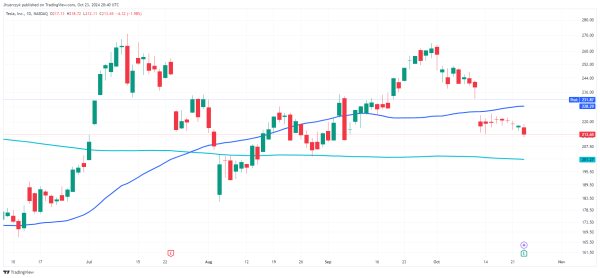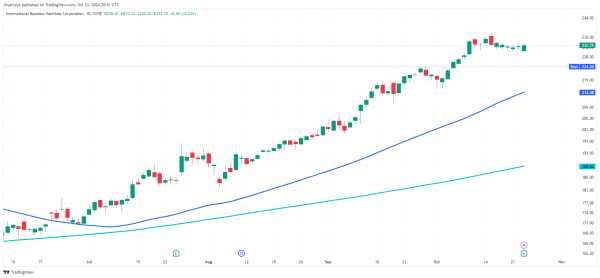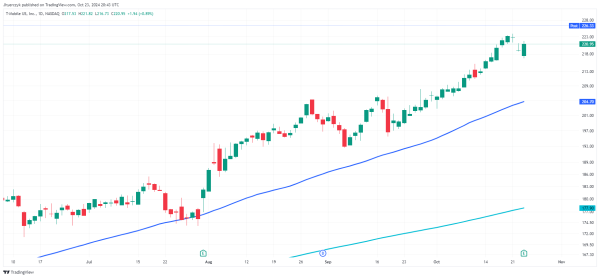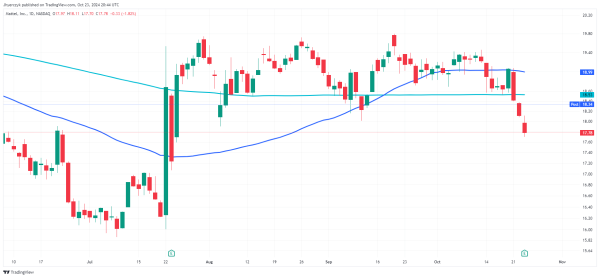Tesla Delivers Margin Strength, IBM’s AI Push Powers Profit Growth
Earnings Shock: Tesla Soars, IBM Gains, Mattel Struggles
Several major companies reported their third-quarter earnings after the close on Wednesday, with a mixed bag of results across the board. Tesla exceeded profit expectations but missed slightly on revenue, IBM showed strength in its software segment but faced challenges elsewhere, and companies like T-Mobile and Mattel provided updates that left investors evaluating the outlook for key industries.
Tesla Surprises with Profit Beat

Tesla (TSLA) reported earnings that beat Wall Street estimates, with adjusted earnings per share (EPS) of $0.72, surpassing the forecasted $0.58. However, the company missed slightly on revenue, posting $25.18 billion against the anticipated $25.37 billion.
Despite the revenue miss, Tesla’s stock rose nearly 5% in after-hours trading, as its third-quarter profit margin exceeded expectations. The company has managed to maintain margins by shifting from aggressive price cuts to offering financial incentives, such as cheaper financing options. Additionally, Tesla’s third-quarter deliveries grew by more than 6% year-over-year, reversing a decline seen in the first half of 2024. Falling raw material costs also provided some relief, although Tesla expects these benefits to wane over time.
Tesla continues to focus on future growth, unveiling new autonomous products like the Cybercab and a 20-seater robotaxi van as part of its push into self-driving technology. Analysts remain optimistic about Tesla’s ability to manage costs and expand into new markets, but concerns over future profit margins persist.
IBM’s Software Segment Leads Growth

International Business Machines (IBM) also beat earnings expectations, reporting $2.30 per share in adjusted earnings, compared to the anticipated $2.23. The company’s performance was driven by its software segment, which saw nearly 10% growth, reaching $6.52 billion in revenue. This marks the largest jump in three years for the division, as companies continue to invest in cloud infrastructure and artificial intelligence (AI) technology, including IBM’s Watsonx platform.
However, IBM’s overall revenue of $14.97 billion fell short of the expected $15.07 billion. Weakness in its consulting and infrastructure segments, both of which showed little or no growth, weighed on the company’s total sales. Consulting revenue declined by 0.5%, as many clients delayed shorter-term projects, opting for larger AI-driven initiatives that will take time to materialize in IBM’s results.
The company’s AI Book of Business has grown significantly, up $1 billion from the previous quarter, reflecting long-term client interest in AI solutions. However, IBM faces near-term challenges from economic uncertainties such as rising interest rates and inflation, which may slow investment.
Other Notable Earnings: T-Mobile and Mattel

T-Mobile (TMUS) outperformed expectations, adding 865,000 postpaid phone subscribers, far exceeding estimates of 727,500. The telecom giant’s strength lies in its 5G offerings, which bundle premium services like Netflix at competitive prices, fueling demand. T-Mobile also raised its full-year forecast for customer additions, further bolstering its market position.

Mattel (MAT), on the other hand, cut its full-year sales forecast, citing weaker toy demand heading into the holiday season. The Barbie parent saw net sales decline 4% year-over-year in Q3, and expects 2024 sales to be flat or slightly down compared to last year. Despite challenges, Mattel has implemented aggressive cost-cutting measures, raising its margin expectations, which could provide a cushion as the company navigates a challenging market environment.
Earnings Signal Uncertainty: Strong Tech Results, Consumer Goods Struggle
Overall, Wednesday’s earnings reports highlight contrasting performances across sectors. Tesla and IBM beat profit expectations but face future margin pressure and economic challenges, respectively. T-Mobile’s strong subscriber growth is a positive sign for telecom, while Mattel faces continued headwinds in the toy market. The outlook for the broader market remains mixed, with bullish trends for tech-driven companies and cautious sentiment in consumer goods.